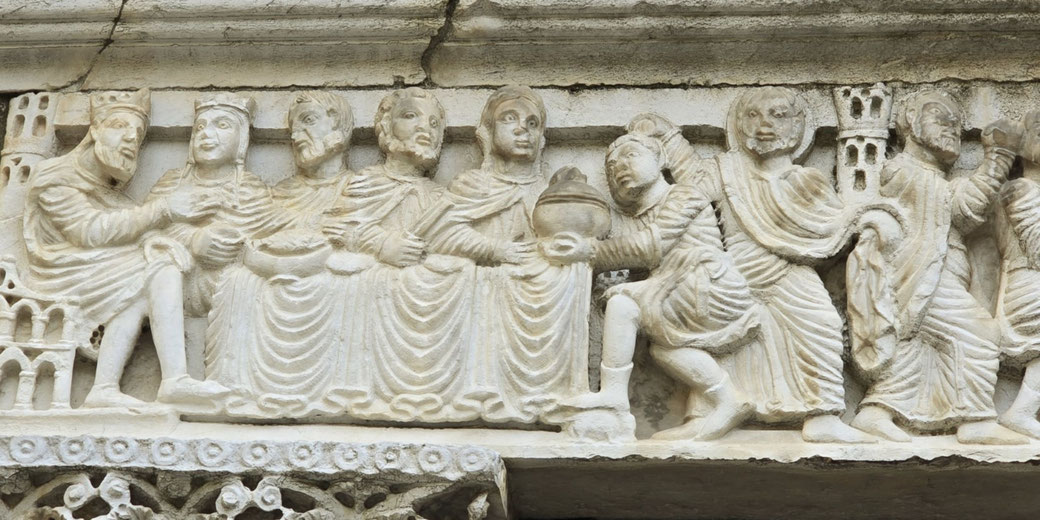What was medieval feudal society like?

Feudalism was a way of structuring society during the Middle Ages, which created an informal set of reciprocal legal and military obligations that affected everyone's lives in Medieval Europe from the 9th to the 15th centuries.
William the Conqueror introduced the feudal system in England after his conquest in 1066, and by 1086, he had commissioned the Domesday Book, a detailed survey of land and resources to establish taxation.
However, the origins of the feudal system date before this time and developed over several centuries as a way of organising society after the fall of the Roman empire.
By the time of the Middle Ages, it had become a rigid hierarchy that was exceedingly difficult to change.
How the feudal system worked
The term 'feudalism' was coined by historians in the 17th century to describe the social and political systems of the Middle Ages, although it was not used by people living during that era.
Under feudalism, people were placed on a theoretical ladder. Those at the top of the ladder had the most power, and those at the bottom had very little power.
Depending on which rung you were on in between these two extremes, gave you more power the higher up the ladder you were positioned.
However, no matter where you sat on this ladder, you had both duties and benefits.
Duties were things you owed to other people: usually those above you on the ladder.
Whereas benefits were the things other people gave you: usually those above you on the ladder as well.
In the feudal system, a vassal was a person who pledged loyalty and service to a lord in exchange for land or protection.
The lord, who was higher in the social hierarchy, granted the vassal a portion of land, known as a fief, along with the responsibility of managing it and providing military support when required.
This relationship was based on mutual obligations, where the vassal owed the lord military service, advice, and a portion of the produce from the land, while the lord, in return, offered protection and the right to govern the land.
The bond between vassal and lord was usually formalized through a ceremony involving the swearing of oaths.
In this ceremony, vassals would kneel before their lord, placing their hands between the lord's hands, and swear loyalty and service (often known as an Oath of Fealty).
The power of a medieval king
In the feudal system, the king stood at the apex of the social hierarchy, holding ultimate authority and ownership over all the land in the kingdom.
Although he technically owned all the land, the king delegated large portions of it to his most trusted nobles, the barons, in exchange for their loyalty and military support.
This distribution of land was essential for maintaining control over the vast expanses of the kingdom, as the king relied on his vassals to enforce his rule and defend the realm.
In return, the king provided protection to his vassals, supported them in disputes, and maintained the overall stability of the kingdom.
Despite his power, the king's authority was often challenged, making the relationship with his vassals critical to his ability to govern effectively.
The role of the barons
Barons were powerful nobles who acted as intermediaries between the king and the lower ranks of society.
They were granted the lordship of vast territories, which meant that barons held significant authority over the people living within their fiefs. This included knights, peasants, and serfs.
The barons were responsible for maintaining order, administering justice, and ensuring that taxes and military resources were provided to the king when needed.
In addition to their military duties, barons often wielded considerable political influence, serving as advisors to the king.
Their power and wealth made them central figures in the feudal hierarchy, but they also faced the constant challenge of balancing their obligations to the king with managing their own domains effectively.
What did knights do in the feudal system?
However, barons faced a similar problem to the king: they couldn't be everywhere at once, even in their smaller section of the kingdom.
Therefore, they divided their region into smaller regions and assigned the next rung on the ladder to look after it: the knights.
In a similar way, the knights gained the benefit of drawing income from their assigned land but owed a duty to fight for the baron when required.
Under feudal obligations, vassals such as barons and knights were typically required to provide around 40 days of military service each year to their lords.
Knights were expected to adhere to the Code of Chivalry, which promoted ideals like bravery, honor, and respect for women, although in practice, this code was often more aspirational than strictly followed.

The bailiffs and reeves
Bailiffs and reeves acted as the day-to-day managers of the land on behalf of the barons.
The bailiff, typically appointed by their lord, was responsible for overseeing agricultural production, collecting rents, managing finances, and ensuring that the section of land they were tasked with overseeing operated efficiently.
They also handled legal matters within the manor by presiding over the manorial court in order to resolve disputes among the peasants.
The reeve, on the other hand, was usually elected by the peasants and served as a liaison between the lord and the villagers.
They usually coordinated the work of the peasants, organized the harvest, and ensured that everyone fulfilled their obligations to the lord.
Both the reeve and the bailiff were expected to maintain the smooth operation of the manor, ensuring that the feudal obligations were met and that the estate remained productive and profitable.

Peasants and serfs in feudal society
And finally, beneath the reeves and bailiffs on the feudal hierarchy were the peasants.
Peasants, who formed the backbone of feudal society, typically lived in small, one-room houses made of wattle and daub, and subsisted on a diet largely composed of bread, vegetables, and occasionally meat.
They were usually farmers, who had their own section of land on which they had to grow their crops.
This land was theoretically given to them from the reeves and bailiffs.
The peasants were required to pay taxes on the crops they harvested every year.
This tax is what supplied the income for all of the people above them on the social ladder.
Peasants also had a duty to fight in their lord's armies when required. However, the peasants had the added benefit of being protected by the military forces of their lords.
The was a particular sub-category of peasants called 'serfs' that had less freedom than normal.
These peasants were legally bound to the land owned by a lord. They could not leave the land or sell it without the lord’s permission, and their children typically inherited their status.
In exchange for the right to work a small plot of land, serfs were required to perform labor on the lord’s demesne, pay various taxes, and fulfill other obligations such as repairing roads or buildings.
While they had some legal protections and were not considered slaves, their lives were heavily restricted, and they had little personal freedom.
This was in contrast to the so-called 'free peasants' who owned or rented their land.
They had the freedom to move, and could sell their produce or even move to another lord’s land if they wished.
What was the manor system?
The system of land distribution as outlined above, was able to work due to something called the Manor system.
A manor was an expensive mansion built by barons or knights that oversaw large villages.
These manors were a focal point for local communities, and towns usually developed around them.
Each town usually had a marketplace, a church, and a tithe barn, where all of the taxes were stored.
Even though barons or knights owned the manor, they were rarely there in person, so their reeve or bailiff usually lived there.
As a result, the manor became a place where legal disputes were also resolved.
Manorial courts, which were presided over by the lord or his representatives, were the main venues for local justice, and they dealt with everything from land disputes to minor criminal offenses.
Some communities were wealthy and important enough to also have a castle.
Castles were expensive structures and usually took several generations to finally complete.
If a town was large enough, a king, baron or knight would pay for a defensible hill nearby to be fortified with a castle.
The benefit of this was, in case of an attack, everyone in the community could hide behind the castle wall for safety.
This was considered to be one of the most practical benefits of the feudal system for all rungs of medieval society.

What happened to the Feudal System?
When the Black Death struck Europe between 1347 and 1351, it significantly weakened the feudal system because it led to a massive reduction in the population.
As lords had a sudden lack of vassals to work their lands, they had to change the nature of their relationship.
As a result, it shifted the balance of power towards the peasantry, since they could begin demanding better pay and conditions from those in power.
So, by the 15th century, it had largely been replaced by other forms of government and land management, especially in Western Europe.
Further reading
What do you need help with?
Download ready-to-use digital learning resources
Copyright © History Skills 2014-2025.
Contact via email
With the exception of links to external sites, some historical sources and extracts from specific publications, all content on this website is copyrighted by History Skills. This content may not be copied, republished or redistributed without written permission from the website creator. Please use the Contact page to obtain relevant permission.





